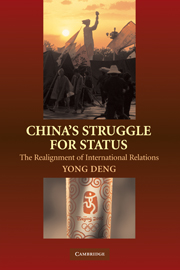Book contents
- Frontmatter
- Contents
- Figure and Tables
- Preface
- 1 Introduction
- 2 International Status and Chinese Foreign Policy
- 3 Negotiating the Human Rights Standard
- 4 Reacting to “China Threat Theories”
- 5 Strategic Partnerships with Russia, the European Union, and India
- 6 Independent Rivalry with Japan
- 7 Rediscovering Asia and Africa: The Multilateral Turn
- 8 Taiwan and China's Rise
- 9 China's Foreign Relations and the Emerging Great-Power Politics
- Index
4 - Reacting to “China Threat Theories”
Published online by Cambridge University Press: 05 September 2012
- Frontmatter
- Contents
- Figure and Tables
- Preface
- 1 Introduction
- 2 International Status and Chinese Foreign Policy
- 3 Negotiating the Human Rights Standard
- 4 Reacting to “China Threat Theories”
- 5 Strategic Partnerships with Russia, the European Union, and India
- 6 Independent Rivalry with Japan
- 7 Rediscovering Asia and Africa: The Multilateral Turn
- 8 Taiwan and China's Rise
- 9 China's Foreign Relations and the Emerging Great-Power Politics
- Index
Summary
The so-called “China threat theories,” are essentially foreign attributions to China as having a harmful, destabilizing, and even pernicious international disposition. If human rights raise questions about China's polity and its possible foreign policy ramifications, the notion of a “China threat” has more direct bearing on how the rising power is treated abroad. As such, the battle over China threat theories has taken center stage, where the action-reaction concerning the international politics surrounding the People's Republic China (PRC) has played out.
To decipher this interactive process, I draw on the concept of the “security dilemma,” but I make and demonstrate two propositions dissimilar to the standard realist expositions. First, states rely on each other's reputed character to infer intentions and to determine treatment accordingly. In the post–cold war world of U.S. hegemony and great-power peace, a state's threat reputation leads to social derogation and out-group status, which in turn intensifies the security dilemma logic in the international reaction to its power. As an emerging power, the status-conscious PRC has been doubly sensitive to the dynamics of this reputation. Second, given the clear stakes involved, the defamed state will be motivated to take corresponding steps, and may succeed, to secure power and acceptance. The way China has managed its foreign relations has shown that the security dilemma in contemporary world politic is potent but not ineluctable.
Threat Reputation and the Security Dilemma: A Reconsideration
Mainstream realism and deterrence theory argue that establishing a reputation for power and a resolve to carry out security commitments is paramount in the state's security policy.
- Type
- Chapter
- Information
- China's Struggle for StatusThe Realignment of International Relations, pp. 97 - 127Publisher: Cambridge University PressPrint publication year: 2008



